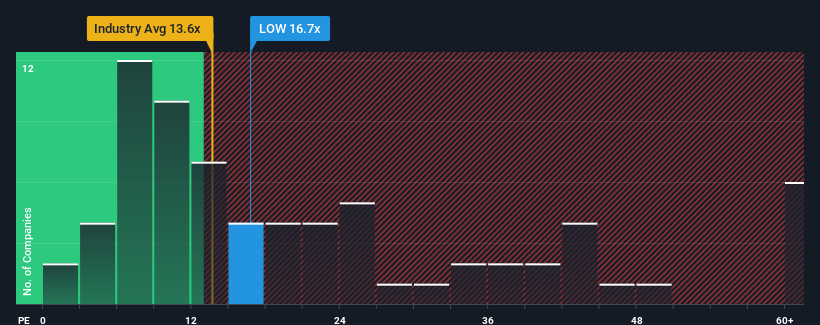- United States
- /
- Specialty Stores
- /
- NYSE:LOW
Investor Optimism Abounds Lowe's Companies, Inc. (NYSE:LOW) But Growth Is Lacking

There wouldn't be many who think Lowe's Companies, Inc.'s (NYSE:LOW) price-to-earnings (or "P/E") ratio of 16.7x is worth a mention when the median P/E in the United States is similar at about 17x. Although, it's not wise to simply ignore the P/E without explanation as investors may be disregarding a distinct opportunity or a costly mistake.
With its earnings growth in positive territory compared to the declining earnings of most other companies, Lowe's Companies has been doing quite well of late. It might be that many expect the strong earnings performance to deteriorate like the rest, which has kept the P/E from rising. If not, then existing shareholders have reason to be feeling optimistic about the future direction of the share price.
Check out our latest analysis for Lowe's Companies

How Is Lowe's Companies' Growth Trending?
In order to justify its P/E ratio, Lowe's Companies would need to produce growth that's similar to the market.
Taking a look back first, we see that the company grew earnings per share by an impressive 26% last year. The strong recent performance means it was also able to grow EPS by 88% in total over the last three years. Accordingly, shareholders would have probably welcomed those medium-term rates of earnings growth.
Turning to the outlook, the next three years should generate growth of 6.8% per year as estimated by the analysts watching the company. With the market predicted to deliver 13% growth per year, the company is positioned for a weaker earnings result.
In light of this, it's curious that Lowe's Companies' P/E sits in line with the majority of other companies. Apparently many investors in the company are less bearish than analysts indicate and aren't willing to let go of their stock right now. Maintaining these prices will be difficult to achieve as this level of earnings growth is likely to weigh down the shares eventually.
The Final Word
Generally, our preference is to limit the use of the price-to-earnings ratio to establishing what the market thinks about the overall health of a company.
Our examination of Lowe's Companies' analyst forecasts revealed that its inferior earnings outlook isn't impacting its P/E as much as we would have predicted. When we see a weak earnings outlook with slower than market growth, we suspect the share price is at risk of declining, sending the moderate P/E lower. Unless these conditions improve, it's challenging to accept these prices as being reasonable.
Before you take the next step, you should know about the 2 warning signs for Lowe's Companies (1 shouldn't be ignored!) that we have uncovered.
Of course, you might find a fantastic investment by looking at a few good candidates. So take a peek at this free list of companies with a strong growth track record, trading on a low P/E.
New: AI Stock Screener & Alerts
Our new AI Stock Screener scans the market every day to uncover opportunities.
• Dividend Powerhouses (3%+ Yield)
• Undervalued Small Caps with Insider Buying
• High growth Tech and AI Companies
Or build your own from over 50 metrics.
Have feedback on this article? Concerned about the content? Get in touch with us directly. Alternatively, email editorial-team (at) simplywallst.com.
This article by Simply Wall St is general in nature. We provide commentary based on historical data and analyst forecasts only using an unbiased methodology and our articles are not intended to be financial advice. It does not constitute a recommendation to buy or sell any stock, and does not take account of your objectives, or your financial situation. We aim to bring you long-term focused analysis driven by fundamental data. Note that our analysis may not factor in the latest price-sensitive company announcements or qualitative material. Simply Wall St has no position in any stocks mentioned.
About NYSE:LOW
Lowe's Companies
Operates as a home improvement retailer in the United States.
Established dividend payer and good value.


